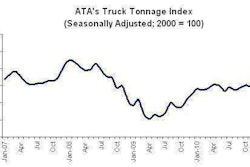
The American Trucking Associations on Friday, Feb. 25, called on the Obama administration to stop blocking access to U.S.-held energy assets, arguing that current world events are showing the importance of energy independence.
“The trucking industry requires more than 34 billion gallons of diesel fuel to deliver essential commodities like food, medicine, clothing and fuel,” said Rich Moskowitz, ATA vice president and regulatory affairs counsel. “Despite advances in alternative energy, the trucking industry will continue to depend on traditional diesel fuel for the foreseeable future.”
Moskowitz on Thursday, Feb. 24, testified on ATA’s behalf during a Department of Interior hearing on the agency’s five-year plan for offshore oil and gas production.
Bill Graves, ATA president and chief executive officer, said current events in Egypt and Libya have highlighted how fragile the global oil market is, putting the trucking industry at risk for rapid price spikes, even as the nation slowly begins to roll to an economic recovery. “Fuel is our members’ second-largest expense, so uncontrollable spikes cut right at their bottom line,” Graves said.
Moskowitz said that until U.S. policymakers promote the development of domestic sources of energy such as those on the Outer Continental Shelf, America’s consumers and truckers will become more dependent on sources of foreign oil. “Rising fuel prices hurt truckers twice – first by increasing their operating costs and then by reducing freight volumes as consumers spend more on energy and are forced to reduce their spending on other consumer goods,” he said.
ATA said that the trucking industry spent an estimated $101.5 billion on diesel fuel in 2010, a 28 percent increase over the previous year. Before the current spike in crude oil prices, ATA estimated that in 2011 carriers would spend roughly $20 billion more at the pump than they did last year.
The American Trucking Associations on Friday, Feb. 25, called on the Obama administration to stop blocking access to U.S.-held energy assets, arguing that current world events are showing the importance of energy independence.
“The trucking industry requires more than 34 billion gallons of diesel fuel to deliver essential commodities like food, medicine, clothing and fuel,” said Rich Moskowitz, ATA vice president and regulatory affairs counsel. “Despite advances in alternative energy, the trucking industry will continue to depend on traditional diesel fuel for the foreseeable future.”
Moskowitz on Thursday, Feb. 24, testified on ATA’s behalf during a Department of Interior hearing on the agency’s five-year plan for offshore oil and gas production.
Bill Graves, ATA president and chief executive officer, said current events in Egypt and Libya have highlighted how fragile the global oil market is, putting the trucking industry at risk for rapid price spikes, even as the nation slowly begins to roll to an economic recovery. “Fuel is our members’ second-largest expense, so uncontrollable spikes cut right at their bottom line,” Graves said.
Moskowitz said that until U.S. policymakers promote the development of domestic sources of energy such as those on the Outer Continental Shelf, America’s consumers and truckers will become more dependent on sources of foreign oil. “Rising fuel prices hurt truckers twice – first by increasing their operating costs and then by reducing freight volumes as consumers spend more on energy and are forced to reduce their spending on other consumer goods,” he said.
ATA said that the trucking industry spent an estimated $101.5 billion on diesel fuel in 2010, a 28 percent increase over the previous year. Before the current spike in crude oil prices, ATA estimated that in 2011 carriers would spend roughly $20 billion more at the pump than they did last year.












